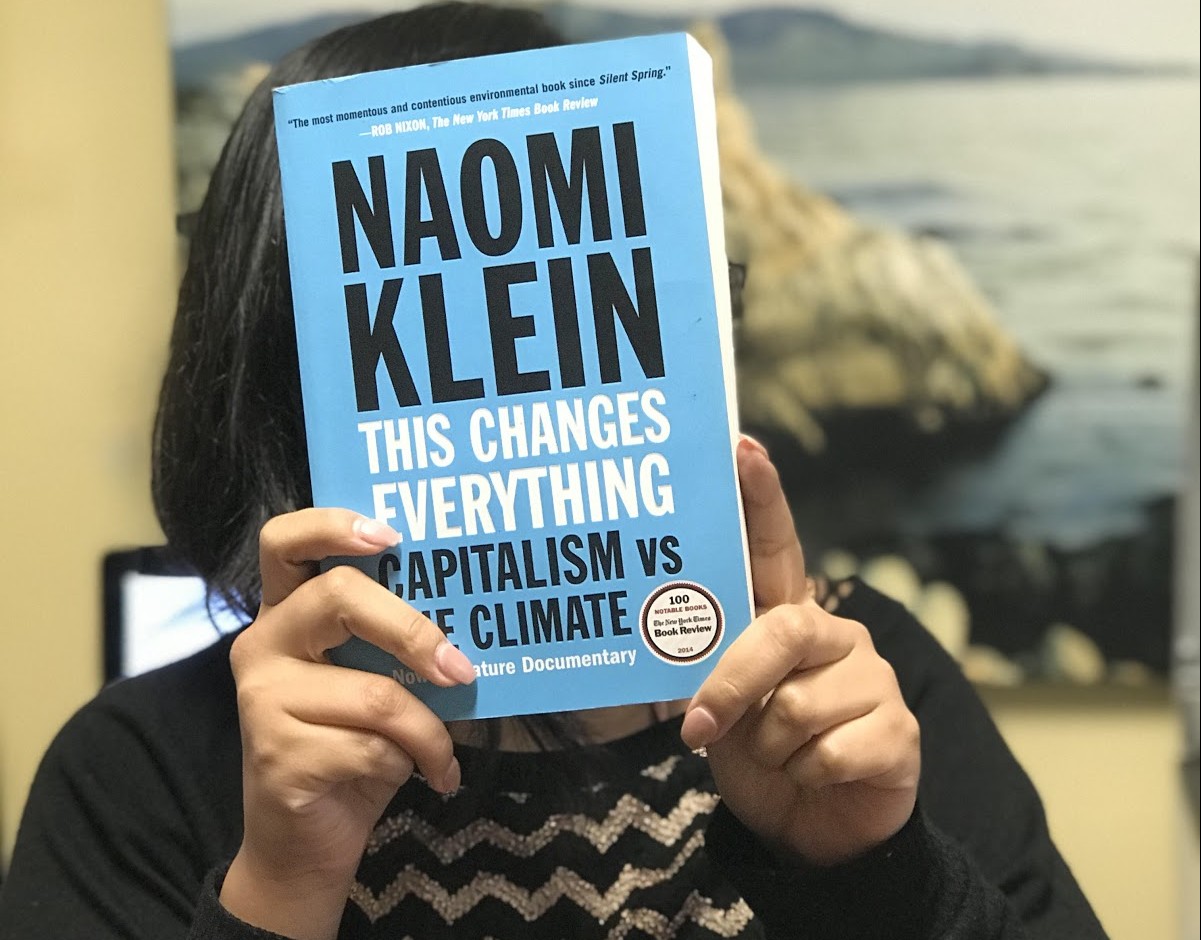Climate Change Book Review

This Changes Everything: Capitalism vs. The Climate
Naomi Klein
532 Pages, Alfred A. Knopf, $16.20
The beginning of the book discusses the science of climate change and why its critics are so invested in pretending it’s not real. They are ignoring its history and how free market trade laws contribute to climate change. They are disregarding how the ‘extractivist’ mentality has corrupted even Big Green groups, such as The Nature Conservancy, which shockingly drills for oil on its own land preserve. They pay no attention to the trust that so many people place in what Klein calls “magical thinking” which is the belief that “technology alone will help us to pull the climate rabbit out of the fossil-fuel hat.”
There were times when we could barely keep reading because Klein’s descriptions were so grim and depressing. One particularly upsetting section was about a geoengineering conference. The conference took place in England. Wealthy scientists and pseudo-science dabblers (including Bill Gates) have blot out the sun and cool the earth using atmospheric sulfur injections. What’s terrifying is how this “Solar Radiation Management” is treated as a Plan A, when we haven’t even tried far less radical solutions.
“...our economic system and our planetary system are now at war. Or, more accurately, our economy is at war with many forms of life on Earth, including human life.”
Half of the book consisted of Klein’s various stories of successful environmental activism. At one point she states “The climate movement has yet to find its full moral voice on the world stage, but it is most certainly clearing its throat – beginning to put the very real thefts and torments that ineluctably flow from the decision to mock international climate commitments alongside history’s most damned crimes.” Essentially, she is summarizing her argument that people are avoiding the topic of climate change, however she points out that with the various environmental activism that is going on people are finally starting to see the problem.
Klein argues, “We have not done the things necessary to lower emissions because these things fundamentally conflict with deregulated capitalism, the reigning ideology for the entire period we have been struggling to find a way out of this crisis.” In other words, people have not done the necessary things to help the environment because they conflict with our economy and way of life. She argues that we are left in a situation where we struggle to find a solution for since it requires a huge turning point to technology filled life.
Towards the end of This Changes Everything Capitalism Vs Climate Change, Klein starts to use a more hopeful tone. Klein writes about Blockadia, a new style of environmental activism that is considered very much ground-based. Various groups of people are overcoming historical differences and joining forces in natural regions that are threatened by the fossil-fuel extraction. Klein gives examples of how people are starting to protest for change. Some of the examples she talks about are people who are physically blocking roads, standing in front of bulldozers, and climbing into oil pipes. She explains how extractors, who for decades were allowed to do whatever they wanted, are left confused and puzzled since they have to faced with the environmental activism.
After reading the book, we felt a sense of abandonment, and, we were left wondering, “What can we do as individuals to solve the issue of climate change?” We had been waiting for suggestions about lifestyle changes, organizations we could join, resources we could use. Simplistic though it may sound, we wanted to know what she thinks about flying, driving, eating meat, and consumerism, but there was none of that. It was a bit of a letdown. Overall, we enjoyed reading the book because the purpose of it was to galvanize the ordinary citizens of the earth to action. We were fascinated by her style of writing in which she incorporated various sources from small interviews all the way to research from Yale University.
Climate change is real. U.S citizens should especially care about climate change because it affects us in everyday life. For instance, climate change results in food shortages. Scientists reveal that climate change result in more extreme weather events including high precipitation in some areas and drought in others. Climate change is also affecting bumble bees by shrinking the area where they can live. Many bee species (especially honey bees and bumblebees) are responsible for pollinating many of the foods that we eat regularly and love. Without bumblebees, we will not have the following crops: apples, cucumbers, broccoli, onions, pumpkins, carrots, avocados, almonds.
Aspects of the natural world that we take for granted will also be greatly impacted. According to the U.S. Geological Survey, we are beginning to lose coral reefs, including the Great Barrier Reef, as tropical islands are losing their ability to protect themselves against weather events and face erosion and salinization of drinking water resources.
Moreover, Florida is particularly vulnerable to an increased rate of sea level rise in the future as a result of climate change. There are two main causes of sea level rise in Florida: melting ice from the North and the South Poles and slowing of the Gulf Stream. Due to the significantly increasing rate of ice melt since 1992 and fresh water melting into the ocean, it has contributed the slowing down the Gulf Stream. Republican senators from Florida are frustrated about President Trump’s stance on climate change because they are worried thousands of citizens living there will lose their home.
Did You Know...
During the 2016 election, no candidates were inquired about their stance on climate change?